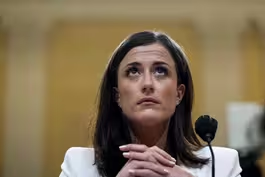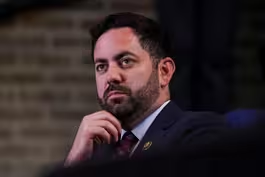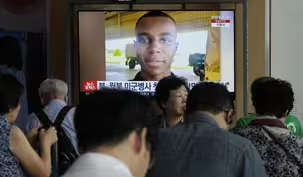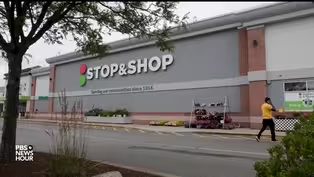
Political theorist promotes plan to reinvent U.S. democracy
Clip: 9/27/2023 | 11mVideo has Closed Captions
Political theorist promotes 'Our Common Purpose' plan to reinvent American democracy
A new Pew Research Center study confirmed what you might already suspect: Americans feel intense dissatisfaction with the way our government currently works and a growing distaste for both political parties. One of the main voices calling for sweeping change is Danielle Allen, a political theorist at Harvard. Judy Woodruff followed her to Tennessee for her series, America at a Crossroads.
Problems playing video? | Closed Captioning Feedback
Problems playing video? | Closed Captioning Feedback
Major corporate funding for the PBS News Hour is provided by BDO, BNSF, Consumer Cellular, American Cruise Lines, and Raymond James. Funding for the PBS NewsHour Weekend is provided by...

Political theorist promotes plan to reinvent U.S. democracy
Clip: 9/27/2023 | 11mVideo has Closed Captions
A new Pew Research Center study confirmed what you might already suspect: Americans feel intense dissatisfaction with the way our government currently works and a growing distaste for both political parties. One of the main voices calling for sweeping change is Danielle Allen, a political theorist at Harvard. Judy Woodruff followed her to Tennessee for her series, America at a Crossroads.
Problems playing video? | Closed Captioning Feedback
How to Watch PBS News Hour
PBS News Hour is available to stream on pbs.org and the free PBS App, available on iPhone, Apple TV, Android TV, Android smartphones, Amazon Fire TV, Amazon Fire Tablet, Roku, Samsung Smart TV, and Vizio.
Providing Support for PBS.org
Learn Moreabout PBS online sponsorshipGEOFF BENNETT: A new Pew Research study has confirmed what you might already suspect.
Americans feel intense dissatisfaction with the way our government currently works and a growing distaste for both political parties.
One of the main voices calling for sweeping change is Danielle Allen, a political theorist at Harvard.
Judy Woodruff followed her to Tennessee to explore some of her ideas for our ongoing series America at a Crossroads.
DANIELLE ALLEN, Harvard University: But we don't really seem like we can actually address real problems that we have in our society.
So there's real basis for people's frustration with where democracy is.
JUDY WOODRUFF: These days, Danielle Allen is on a mission, crisscrossing the country to talk about how our democracy isn't doing what it was designed to do and needs radical change.
DANIELLE ALLEN: We have to redesign our institutions so that they are responsive and accountable at the same time that we are also reconnecting people to their own civic experience, power and responsibility.
JUDY WOODRUFF: A political theorist at Harvard, Allen was pushed into action by what she calls red alerts, single-digit approval ratings for Congress, record distrust of the federal government, declining voter participation, falling support for democracy among younger generations, and a very personal sense of frustration with government in action.
DANIELLE ALLEN: I lost my youngest cousin, Michael, shot and killed.
And his life journey is a -- really was a difficult one and it's a hard story.
He spent about 12 years in prison and then was shot and killed by somebody that he had met while he was in prison.
And losing Michael was a real sort of wakeup call moment for me.
So my first effort was to dig into specific policy domains, for example, criminal justice reform.
But I soon realized that, even where we had bipartisan solutions, you couldn't get them through, especially at the federal level, because of governance dysfunction.
JUDY WOODRUFF: From 2018 to 2020, she co-chaired a bipartisan commission for the American Academy of Arts and sciences that produced our common purpose, a report detailing 31 recommendations on how to reinvent American democracy in the 21st century.
They included an 18-year term limit for Supreme Court justices, a constitutional amendment on campaign finance laws, holding federal elections on Veterans Day, a holiday, and dramatically expanding the House of Representatives.
To do that, Allen adds, she would end partisan primaries.
And a personal note: I served on that commission, but did not advocate for any policy changes.
DANIELLE ALLEN: Our constitutional democracy is, in effect, a house that our forefathers and foremothers have built and that we have inherited and live in.
Doesn't exactly fit all of our needs in the 21st century.
JUDY WOODRUFF: Allen highlighted some of these ideas last week during lectures at the Institute of American Civics at the University of Tennessee in Knoxville.
DANIELLE ALLEN: We're a lot bigger people.
We're a lot more complex.
The house wasn't really built for everybody in the first place, so there's a need to renovate to address all of those features of our current situation.
JUDY WOODRUFF: Following her class, we sat down to talk through some of those recommendations in the office of former Tennessee Senator Howard Baker, the institute's namesake.
One of the recommendations that you have talked about a lot is increasing the size of the House of Representatives.
Why is it necessary?
DANIELLE ALLEN: When the Constitution was ratified, the expectation was that the House of Representatives would grow continuously, decade to decade, with each census.
That's what happened up until 1929.
In 1929, there were some tough politics about exactly how to do reapportionment, and they just kind of gave up and decided to cap the size of the House as it was then at 435.
So at that point, we stopped growing.
Originally, the hope was for a ratio of about 30,000 constituents to every representative.
We're up to 750,000.
And so that sort of tight bond that connects a representative to the practical realities of their district is just not where it was and not what we need.
There's also issues of money in politics.
The bigger the district, the more expensive it is to run for office, and the more influence money has on the behavior of our elected representatives.
JUDY WOODRUFF: In her ongoing opinion series on constitutional democracy for The Washington Post, Allen worked with architect Michael Murphy to figure out if it was physically possible to expand the House chamber to accommodate more members.
They found they could nearly quadruple the number of representatives without having to construct a new building.
How do you get members of Congress to vote to dilute their own power?
DANIELLE ALLEN: Yes.
JUDY WOODRUFF: Because, essentially, that's what they'd be doing.
DANIELLE ALLEN: Well, I don't think the path to this change goes through Congress as we know it now.
That's the trick.
So the question is, how do you deliver a Congress that might potentially make decisions of this kind about itself?
I think that actually requires work at the state level.
And, in particular, I think we really need to shift away from our reliance on party primaries.
JUDY WOODRUFF: Allen suggests what she calls all-comers preliminaries, which would be open to candidates from any party or no party, with the top finalists advancing to the general election regardless of party affiliation.
These types of races already exist in some form in five states, Louisiana, California, Washington, Alaska, and Nebraska.
So you would first, in order to begin to even think about enlarging the size of the House, you would first change the partisan primary?
DANIELLE ALLEN: That's right.
JUDY WOODRUFF: And is there an appetite, you think, in American politics to do that?
You're asking our political parties to give up some of the clout, a lot of the clout that they have right now.
DANIELLE ALLEN: Yes, I am.
I'm asking the American people, though, to claim their power.
That's where we get into the real conundrum of our current circumstances.
If you look at our current political situation, I think it's fair to say that a supermajority of Americans share the view that they don't actually like the upcoming choices for our election that the two parties are delivering.
So we actually have a supermajority of Americans that doesn't want what look like our likely choices.
Yet that supermajority is trapped by the party system.
JUDY WOODRUFF: And that points to a critical part of Allen's push to update our structure of government, getting more Americans civically educated and engaged, work we witnessed firsthand in Knoxville.
STUDENT: The 70-year-olds, 80-year-olds that are in office currently, I feel like that doesn't accurately represent what I'm looking for in my life.
DANIELLE ALLEN: The average age, for example, of senators just has really climbed precipitously in the 20th century and obviously in our presidential candidates.
So there is a sense of disconnection there across generations as well.
JUDY WOODRUFF: Changing the partisan primary appealed to students we spoke to, who blame partisanship for the level of apathy among their peers.
OWEN LINVILLE, College Student: That's a big problem for my generation, because we have only really known the more partisan politics with the less cooperation.
JACKSON SCOTT, College Student: Many of people my age have really -- are beginning to lose hope in our democracy.
Our vote doesn't count.
Supreme Court justices aren't even elected.
We have career politicians.
JUDY WOODRUFF: Allen's main recommendation for the Supreme Court is to do away with life terms.
DANIELLE ALLEN: It's become clear that the Supreme Court is exceptionally powerful.
It's become more politicized.
What do we do about that?
I am a supporter of term limits on a schedule of everybody serving for 18 years, so that every presidential term would bring two appointments to the judiciary.
JUDY WOODRUFF: Two practitioners of politics, former Tennessee Governors Phil Bredesen, a Democrat, and Bill Haslam, a Republican who refused to back President Trump, served with Allen on the board here at the Institute of American Civics, where they also co-host a podcast that encourages bipartisan civic dialogue.
FMR.
GOV.
PHIL BREDESEN (D-TN): I think any institution like democracy needs kind of a constant renewal and renovation.
And it doesn't do this in its own way.
FMR.
GOV.
BILL HASLAM (R-TN): One of the things I'm increasingly concerned about is how many normal people are saying, I have had enough.
Our democracy won't work if people just check out.
JUDY WOODRUFF: They question whether some of Allen's and the commission's solutions are the right ones, but believe our system isn't working as is.
FMR.
GOV.
BILL HASLAM: I'm not so certain about expanding the size of Congress, but it's worth the debate, if nothing else, for us as a country to recognize, the path we're on right now has not been fruitful in terms of producing actual results lately.
FMR.
GOV.
PHIL BREDESEN: We got there not through some big action, but all sorts of little things that have happened.
I think the solutions are going to be similarly diffuse, and then what it's going to take is a lot of good people like Danielle Allen and what she's doing who are willing to step forward and try to say, I'm going to pull an oar on trying to solve this problem.
JUDY WOODRUFF: Allen acknowledges that all of this work is difficult and will take time, but she finds hope in her own family's story and in this country's history.
DANIELLE ALLEN: I think of my great-grandparents, who I'm sure we're told women having the right to vote is just not realistic.
We have the right to vote.
I think of my grandfather, who I am sure, I know was told social equality for African Americans in the South is not going to happen.
We don't have a perfect world, but we have made a heck of a lot of progress on that dimension, for sure.
So, that's how I see this too.
When people tell me it's not realistic, I just think, hah, hah, hah, you will see.
You will see, because it's necessary, because too many of us feel trapped.
So, I know the appetite for something different is out there.
So, the only question is going to be how we get there.
JUDY WOODRUFF: So it's not Don Quixote?
(LAUGHTER) DANIELLE ALLEN: No, it's not.
It's going to change.
It's going to change.
The only question is how and when.
JUDY WOODRUFF: Big questions and big solutions from someone fighting for change one mind at a time.
For the "PBS NewsHour," I'm Judy Woodruff in Knoxville, Tennessee.
Antitrust lawsuit accuses Amazon of harming consumers
Video has Closed Captions
Clip: 9/27/2023 | 6m 2s | Antitrust lawsuit accuses Amazon of harming consumers and small businesses (6m 2s)
Cassidy Hutchinson on her experience in Trump White House
Video has Closed Captions
Clip: 9/27/2023 | 10m 8s | Cassidy Hutchinson discusses what she saw and experienced in the Trump White House (10m 8s)
GOP Rep. Lawler on disagreements that could lead to shutdown
Video has Closed Captions
Clip: 9/27/2023 | 6m 58s | GOP Rep. Lawler on the disagreements in his party that could lead to a government shutdown (6m 58s)
News Wrap: Soldier who fled to North Korea back in custody
Video has Closed Captions
Clip: 9/27/2023 | 5m 22s | News Wrap: American soldier who fled to North Korea back in U.S. custody (5m 22s)
Students expose price disparities in low-income areas
Video has Closed Captions
Clip: 9/27/2023 | 4m 16s | Student research project draws attention to price disparities in low-income neighborhoods (4m 16s)
War in Ukraine, Russian influence shapes Slovakia's election
Video has Closed Captions
Clip: 9/27/2023 | 8m 12s | How the war in Ukraine and Russian influence is shaping Slovakia's upcoming election (8m 12s)
Providing Support for PBS.org
Learn Moreabout PBS online sponsorship
- News and Public Affairs

FRONTLINE is investigative journalism that questions, explains and changes our world.

- News and Public Affairs

Amanpour and Company features conversations with leaders and decision makers.












Support for PBS provided by:
Major corporate funding for the PBS News Hour is provided by BDO, BNSF, Consumer Cellular, American Cruise Lines, and Raymond James. Funding for the PBS NewsHour Weekend is provided by...





